Students in Arctic Research (STAR) | Aaron Putnam
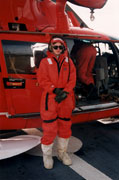 Aaron Putnam
Aaron Putnam
Barrow, AlaskaProject: Cruise to the Northern Ice Pack to Study the Chemical and Biological Properties of Ice and Ice Entrained Sediment
Principal Investigator: Dr. Debra Meese, Cold Regions Research and Engineering Laboratory, Hanover, New Hampshire
TEA Teacher: Tim Buckley, Barrow, Alaska
Biography
Aaron was no stranger to the Arctic when he spent 28 days on board the U.S. Coast Guard ice-breaker Polar Sea as a part of TEA 1998. Aaron's family lived in Barrow for a year prior to his arctic research experience and has since returned to Mapelton, Maine. Barrow impressed Aaron because of features like community spirit, the beauty of the ice, polar bears, aurora borealis, and the extremes of summer light, winter dark, and cold. During his year in Barrow, Aaron appeared weekly as a solo guitarist at the local Mexican restaurant, designed the teacher education web site for Ilisagvik College, and won the 5k Barrow Road Race. A fascination with carnivorous plants led Aaron to join the International Carnivorous Plant Society, which published an article he wrote about some unusual specimens he observed while driving with his family up the Alaska-Canadian Highway. For Aaron, the evolution of carnivorous plants inspires questions about the controversial aspects of evolutionary processes, which have led to Aaron's interest in Chaos Theory. His project on Chaos won grand prize in the Barrow High School Science Fair. For two consecutive years, Aaron won first place in his division of the Alaska State Science Fair while his family lived in Anchorage from 1992 to 1994. Aaron's talent and interest in computer technology led him to be the first high school student in the University of Maine's ASAP Media Services Group, where he helped design the University of Maine web site. He became involved in 3-dimensional computer imaging technology and one of his 3-D models of carnivorous plants was published. Aaron is a member of the National Honor Society, and is beginning his junior year of high school in Presque Isle, Maine. He will continue his involvement in cross-country track, the school jazz band, and his private band, while pursuing his interest in science, which includes studying the function and global influence of Arctic ecosystems.
Sailing through a Solid Sea
By Aaron Putnam
The vast expanse of sea-ice, stretching from horizon to horizon, offers one with a multitude of thought provoking questions. Such a seemingly desolate atmosphere, yet behind it, obscured, is life in its most pure form. A pioneer in this world, I was privileged to be exposed to an ancient process that has been going on seemingly uninterrupted since the beginning of life on earth.
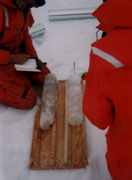 The
sun, spinning furiously around the sky, ceasing to
set - the peaceful pastels of the arctic skies, and
chilling cold that made this last summer the most
incredible one of my life. The AWS (Arctic West
Section) expedition has changed my life in many ways,
and through it I have found many important
answers.
The
sun, spinning furiously around the sky, ceasing to
set - the peaceful pastels of the arctic skies, and
chilling cold that made this last summer the most
incredible one of my life. The AWS (Arctic West
Section) expedition has changed my life in many ways,
and through it I have found many important
answers.
Life was not easy aboard an ice-breaker. Having to
adapt to the military routines, the long hours and
quick showers was no easy task, let alone the wealth
of research that had to be conducted.
My accompanying teacher, Mr. Tim Buckley, having done this expedition once before, was an invaluable resource on the ways of shipboard life. He helped me become accustomed to the maze-like corridors, and introduced me to the many people I would be working with throughout the month of June.
Ultimately, I became very comfortable on the ship, and was able to take time to go outside and marvel at the incredible beauty of the Arctic. Whether it as the walruses basking by the hundreds on the ice, or the subtle gracefulness of the various birds gliding through the crisp northern air, I found myself in a place where I could truly feel at peace, and dispense with all burdens that society tends to bring.
The combination of my love for the outdoors, and the group I worked with on the vessel went hand in hand. Mr. Buckley and I were working with the Cold Regions Research and Engineering Lab (CRREL) researchers Terry Tucker and Bill Bosworth. Their research was centered around the study of ice algae, and how different ice conditions effect ice algae populations. This research required that we venture onto the ice, and collect data along transects to find a relationship between the abundance of algae in given ice conditions. This was an incredible experience, because I was given the opportunity to set foot on this majestic environment, rather than be just a spectator.
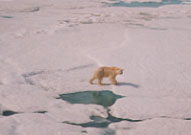 On the outdoor treks, I learned many
incredible things about how the ice pack works, and
more importantly, how it affected algae growth. Prior
knowledge I had concerning our global ecosystem, told
me that algae and like producers are the basis of the
food chain. In the Arctic marine ecosystem, ice-algae
are the main source of energy, and the amount of
ice-algae available depends on the fragile state of
the sea-ice it clings to.
On the outdoor treks, I learned many
incredible things about how the ice pack works, and
more importantly, how it affected algae growth. Prior
knowledge I had concerning our global ecosystem, told
me that algae and like producers are the basis of the
food chain. In the Arctic marine ecosystem, ice-algae
are the main source of energy, and the amount of
ice-algae available depends on the fragile state of
the sea-ice it clings to.
This became more and more apparent to me as the month progressed, and through analyses that Mr. Buckley and I did in the lab, I began to see relationships among algae and the ice's salinity, amounts of sedimentary deposits on that particular flow, temperature of the ice, whether or not the ice was multi-year, whether or not it was ridged or rafted, and many other things. Through these scientific processes, I began to acquire a greater understanding at the world I gazed at from the bow late at night. I began to understand how fragile a world it was, and how delicately balanced. My bedtime reading material consisted of books centered around the animals of the arctic, and I learned more and more about how dependant life is on the ice pack (for example, how drastically Polar Bear populations can change in a single year due to a fluctuation in regular ice patterns). Facts like these only increased my respect for the amazing creatures that can live in that intense environment.
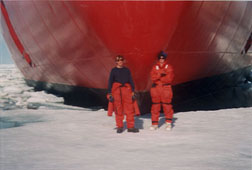 My month on the ice-breaker Polar Sea
opened up so many doors for me. I grew as a human on
every plain -- I gained a higher understanding of an
incredible world, and learned the various scientific
processes that helped me acquire that knowledge. I
became immersed in a career that I could easily see
myself pursuing, a job that I would truly love
&endash; and last but not least, I gained what
one may call a "spiritual awakening" which showed me
how intensely beautiful our small planet can be. It
has rekindled my drive to preserve the environment,
and to keep the Arctic wild. It is truly the last
frontier, but unlike other frontiers, this one is
worth leaving unsettled.
My month on the ice-breaker Polar Sea
opened up so many doors for me. I grew as a human on
every plain -- I gained a higher understanding of an
incredible world, and learned the various scientific
processes that helped me acquire that knowledge. I
became immersed in a career that I could easily see
myself pursuing, a job that I would truly love
&endash; and last but not least, I gained what
one may call a "spiritual awakening" which showed me
how intensely beautiful our small planet can be. It
has rekindled my drive to preserve the environment,
and to keep the Arctic wild. It is truly the last
frontier, but unlike other frontiers, this one is
worth leaving unsettled.
I now realize how absolutely lucky I am to have taken
part in such an awesome mission. I owe an incredible
debt, first of all, to Mr. Tim Buckley. Mr. Buckley
was the person responsible for introducing this idea
to me during the dark, blistering cold winter days in
Barrow. If it hadn't been for him, I would've been
oblivious to such a possibility.
The TEA program, ARCUS, and NSF deserve an infinite
amount of gratitude for organizing the expedition,
and funding it. They were the folks to truly make
this incredible summer come true. I promise to make
this investment worthwhile, for I definitely intend
to follow a career relating to what I did in the
Arctic.
CRREL was amazing as well. It was an honor to work with Terry Tucker and Bill Bosworth, and thanks to Deb Meese, I was able to partake in the CRREL research. Their delightful humor, and vast knowledge on the Arctic inspired me to the point where I would be willing to do this for the rest of my life.
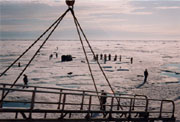 The crew of the Polar Sea was
infinitely valuable. Their willingness to help, and
their generally pleasant attitude made living on the
vessel an incredible experience. Everything from the
"initiation" to the long talks with the captain out
on the bow made the trip a truly amazing one.
The crew of the Polar Sea was
infinitely valuable. Their willingness to help, and
their generally pleasant attitude made living on the
vessel an incredible experience. Everything from the
"initiation" to the long talks with the captain out
on the bow made the trip a truly amazing one.
The science community on board the vessel (a.k.a. the "beakers") was amazing.The fact that the most elite scientists in these fields could tolerate my lack of knowledge was truly astounding.In particular, the lead scientist Dr. Lisa Clough was very nice. But all scientists were absolutely great to get along with -- Tish Yaeger, Will Ambrose, Bob Whritner, Lance Horn, and all of their students.
Oh yeah, I have to thank my mom too, for sending me a birthday cake via helicopter.

